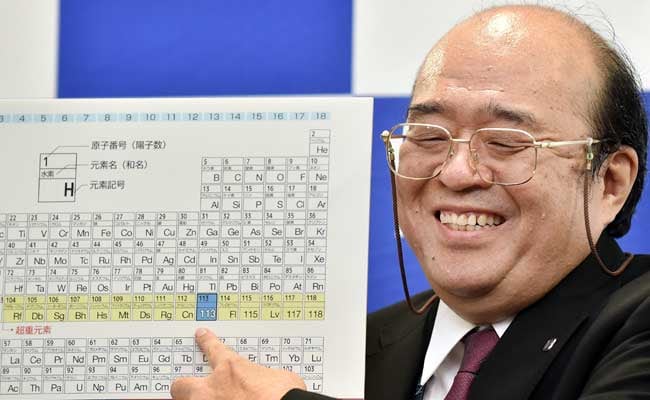
Kosuke Morita, the leader of the Riken team, smiles as he points to a board displaying the new atomic element 113 during a press conference in Wako, Saitama prefecture on December 31, 2015. (AFP Photo)
Tokyo:
A Japanese research team has been granted the right to name new element 113, the first on the periodic table to be named by Asian scientists, the team's institute said today.
Japan's Riken Institute said a team led by Kosuke Morita was awarded the rights from global scientific bodies -- the International Union of Pure and Applied Chemistry (IUPAC) and the International Union of Pure and Applied Physics (IUPAP) -- after successfully creating the new synthetic element three times from 2004 to 2012.
It is the first element on the periodic table to be discovered and named by Asian scientists, Riken said.
Synthetic elements do not occur naturally on Earth and are produced artificially through experiments.
"IUPAC has announced that Morita's group will be given priority for the discovery of the new element, a privilege that includes the right to propose a name for it," Riken said in a statement.
Morita, a professor at Japan's Kyushu University, was informed via a letter from IUPAC on Thursday, Riken said.
A release on IUPAC's website confirmed the accomplishment.
"Several studies published from 2004 to 2012 have been construed as sufficient to ratify the discovery and priority," it said.
The name has yet to be decided, but Riken said that Morita will propose one in 2016.
"I feel grateful that the name will be included in the table for the first time after this recognition," Morita said at a press conference.
The naming right topped the evening news bulletin on public broadcaster NHK television.
Japan has a proud research tradition and its citizens have won about 20 Nobel prizes in science and medicine, including two in 2015.
The naming right is good news for Riken, which last year was embroiled in scandal after it had to withdraw what was once billed as a scientific breakthrough in stem cell reproduction by a young researcher.
IUPAC also said that Russian and US scientists working together had won the naming rights for three other elements -- 115, 117 and 118.
Japan's Riken Institute said a team led by Kosuke Morita was awarded the rights from global scientific bodies -- the International Union of Pure and Applied Chemistry (IUPAC) and the International Union of Pure and Applied Physics (IUPAP) -- after successfully creating the new synthetic element three times from 2004 to 2012.
It is the first element on the periodic table to be discovered and named by Asian scientists, Riken said.
Synthetic elements do not occur naturally on Earth and are produced artificially through experiments.
"IUPAC has announced that Morita's group will be given priority for the discovery of the new element, a privilege that includes the right to propose a name for it," Riken said in a statement.
Morita, a professor at Japan's Kyushu University, was informed via a letter from IUPAC on Thursday, Riken said.
A release on IUPAC's website confirmed the accomplishment.
"Several studies published from 2004 to 2012 have been construed as sufficient to ratify the discovery and priority," it said.
The name has yet to be decided, but Riken said that Morita will propose one in 2016.
"I feel grateful that the name will be included in the table for the first time after this recognition," Morita said at a press conference.
The naming right topped the evening news bulletin on public broadcaster NHK television.
Japan has a proud research tradition and its citizens have won about 20 Nobel prizes in science and medicine, including two in 2015.
The naming right is good news for Riken, which last year was embroiled in scandal after it had to withdraw what was once billed as a scientific breakthrough in stem cell reproduction by a young researcher.
IUPAC also said that Russian and US scientists working together had won the naming rights for three other elements -- 115, 117 and 118.
Track Latest News Live on NDTV.com and get news updates from India and around the world

